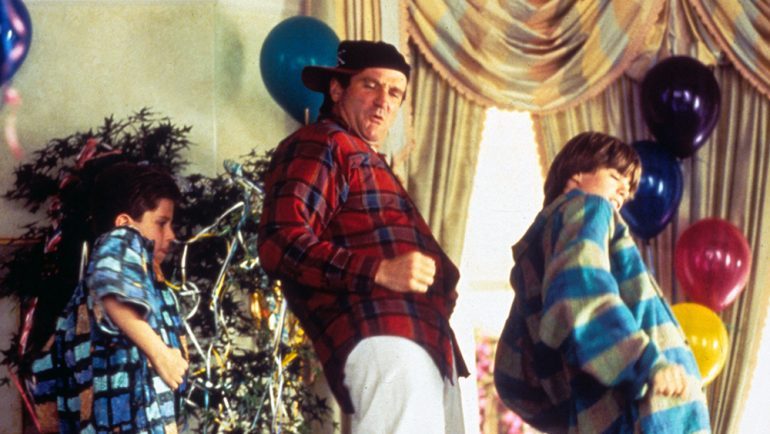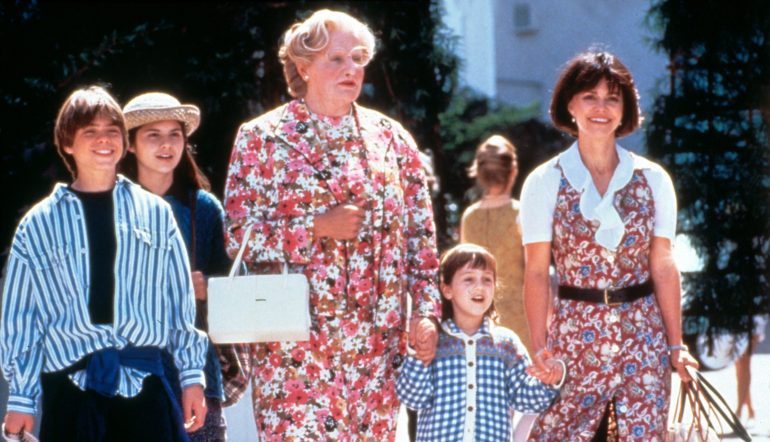‘Mrs. Doubtfire’ at 25: Inside the Making of the Robin Williams Classic
By Susan King
LOS ANGELES (Variety.com) – When Lisa Jakub showed up to audition as the oldest daughter of Robin Williams and Sally Field in “Mrs. Doubtfire,” she was introduced to a matronly Scottish woman. Jakub thought she was talking to the mother of director Chris Columbus, who was in production on the movie that turned out to be an enduring classic comedy after opening Nov. 24, 1993.
“I remember being introduced to Chris Columbus’ mother and thinking I had to really make small talk and be charming because this was my boss’ mom,” said Jakub, who was 14 when she made the film. “I wanted to make a good impression. It wasn’t until later that I realized [it was Williams]. I totally fell for it.”
It didn’t take that long for Matthew Lawrence, then 12, to realize that something was going on. “I started to catch on because I was a working kid. But definitely for two or three minutes I was sitting next to and I had no idea [it was Williams]. I think they didn’t tell me that the cameras were rolling, and they just had us sit down. I think they just wanted to get our natural kids’ reactions.”
His reaction to Mrs. Doubtfire got him the job as Chris. “Robin basically got me the role,” said Lawrence. “He leaned over me and said ‘I really like you. I want you to play my son, so you got to work with me on this one. I’m going to do something, just go with it” He turned his back to the camera and just pinched me so hard, right in that sensitive spot between your arm and your chest. My reaction was a normal reaction — ‘Hey, you can’t do that. You just hurt me. What are you doing?’’’
Everyone in the room started laughing. “That was the moment that got me the role,” he noted “The fact that I reacted that way to Mrs. Doubtfire was what they were looking for and Robin knew that.”
Adapted by Randi Mayem Singer and Leslie Dixon from Anne Fine’s YA novel “Alias Madame Doubtfire,” the comedy-drama revolves around Daniel Hillard (Williams) a freelance voice actor in San Francisco and ultimate man-child who loves his three children, Lydia, Chris and Natalie (Mara Wilson) but his wife Miranda (Field) finds that he’s too unreliable and they divorce.
When Daniel learns Miranda is looking for a housekeeper, he disguises himself — thanks to his make-up artist brother Frank (Harvey Fierstein) and his partner (Scott Capurro) — as the practically perfect nanny, Mrs. Euphegenia Doubtfire.
“Mrs. Doubtfire” earned mixed reviews upon release but earned $441.3 million worldwide and won the Golden Globe for best musical or comedy, where Williams also took home the award for comedy actor. It also won the Oscar for best makeup, and went on to become a beloved TV and video staple.
Singer recalled her first encounter with Williams and his then-wife Marsha, who were also producing, at Mr. Chow’s in Beverly Hills. “He alternated from speaking calmly and articulately in his chair to literally getting up and using the entire space around the table to perform and act out what he was talking about — in character, in that stream-of-consciousness trademark way,” Singer noted .
“I thought to myself that it was a good thing he became an actor and comedian, I couldn’t envision him in any sort of normal job. Meanwhile, everyone in the restaurant was watching and smiling. I felt so incredibly fortunate to be working with him.”
At one point during production, Singer brought her infant son on the set. “Robin, in full costume and makeup, took him in his/her arms and launched into character improvising a whole nanny routine about babies and diapers. He kept the gentle Mrs. Doubtfire persona the whole time. It was hilarious, and it seemed as if he could have gone on forever.”
Tony Award-winning playwright and actor Fierstein came onto the project after doing a benefit with Williams and Lily Tomlin.
“We were raising money for the movie ‘The Celluloid Closet,’” he recalled. “Lily, of course, was a huge hit. Robin, of course, was a huge hit and I bombed spectacularly. But Robin stood in the wings and loved it because he knew that would happen and it had happened to him. “
At the end of the evening they began talking and the conversation led to a discussion of Daniel having a gay brother. “His wife Marsha was there, and she said ‘What a great idea. Harvey should do that.’ They sort of gave me the role.”
It resulted in a strong friendship that lasted until Williams’ tragic death four years ago.
By the time Fierstein joined the cast, “They had already set up a sort of rhythm where you would shoot a scene the way it was written, so they had that in the can. And then we were allowed a certain amount of time, as I remember, and then they would shoot us improvising for an hour.”
Fierstein recalled teaching him to be the exotic 1940s-star Maria Montez, “which I think a little bit of it is in the movie. I taught him some Bette Davis. We just had the best time.”
Working on the film and with Williams was a life-changing experience for the three young actors.
“Mrs. Doubtfire” was the first film for which Wilson, then just five, had auditioned for a role. “It was really amazing. We had all of these meetings with different kids and I remember the second that I got into a room with Matt and Lisa, I knew that I adored them. I knew that they felt like they really could be my brother and sister. I remember secretly wishing and hoping I could get the part, but they would get it too because we did really feel like family. Lisa and I talk all the time now and we saw Matt last week.”
Williams, she noted, “was just lovely the whole time. He was making hand puppets with us and making all kinds of jokes.”
He was especially helpful during the two weeks it took to shoot an elaborate sequence in a restaurant where Daniel as Mrs. Doubtfire is having dinner with his ex-wife, her charming boyfriend (Pierce Brosnan) and his kids, as well as himself with the owner of a TV station where he works.
“He would make a paper bag bark like a dog under the table,” said Wilson. “He never talked down to us. He would get down to our level, literally, looked us in the eye and talk to us very gently. He was warm and friendly and fun and ridiculous the whole time. But you could tell he really understood and loved kids.”
Williams, said Jakub, not only made her a better actor, he also made her a better person
“When you work with Robin, he did not always stick to the script,” said Jakub, who left Hollywood in her early 20s and has had a successful career as a writer and a yoga instructor. She also gives talks about how to overcome anxiety, which she has had since she was young.
“There was a lot of ad-libbing, there was a lot of things that just came out of left field. At the beginning, I was totally freaked out about this. I would just sort of stand there and stare at him and wonder when I was supposed to say my lines. What I learned working with Robin was this deep sense of presence. That you actually stand in the room with that person and listen to them and respond. I feel like it made me more aware in my everyday life.”
Because it was a long shoot due to Williams’ makeup, “There was lot of time for us to just sort of be together,” noted Jakub. “Robin was very open with me about his issues with addiction, his issues with depression and mental wellness. That was incredibly important to me. I had told him about my issues with anxiety. The fact that was so willing to be honest with me had a huge impact on me as a 14-year-old. I’m an advocate for mental health awareness. Part of that stems from that fact that I learned from Robin that’s it’s okay to talk about these things.”
Lawrence, who continues to act, also remembers the quiet moments with Williams, especially when they had a long talk in his trailer after the film wrapped. ”We were exchanging gifts. He gave me this leather-bound script that he signed and wrote this really nice note and I gave him these little metal solders he collected and that really touched him. We talked for a good 30 minutes about life. He had his heart on the sleeve all the time. He was such a loyal and exposed human being.”
Audiences in 1993 and until this day have found “Mrs. Doubtfire” to be a healing experience.
“I have had so many people come up to me and want to talk about the because it was so meaningful to them and really helped them get through their parents’ divorce,” said Jakub. “This idea this might not be the way that you thought your life was going to be that doesn’t mean that it’s bad or wrong. You’re going to be okay. That’s a really powerful message.”
Wilson, who quit acting in her early teens and has also become a writer, recalled the time she got a new apartment. “I needed a spare set of keys. The woman at the front desk that they were an extra $20. I said okay let me go back and get my wallet. She said ‘No, actually l am going to give you these for free because you were in ‘Mrs. Doubtfire’ and that movie got me through a really hard time in my life.”
Singer felt it was important that Chris and Miranda didn’t get back together at the conclusion. “Anne Fine’s children’s book seemed to be written to help kids cope with divorce,” she explained.
“It would’ve not only have done a disservice to that intent, but it would leave kids in the audience with false hope. Just because parents fail as a married couple doesn’t make it acceptable to fail as co-parents. I’m so proud that in 1993, we had a message that says there are all kind of families and that includes families where the parent were no longer married.”


